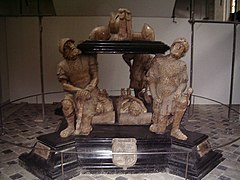Engelbert II of Nassau: Difference between revisions
m Category:People from Breda |
Stalwart111 (talk | contribs) general clean up - fixed links, prose, english, grammar, etc |
||
| Line 2: | Line 2: | ||
[[File:PraalgrafengelbrechtIIbreda.jpg|240px|thumb|'''The grave of Engelbert II''' at the ''Grote Kerk'' in [[Breda]], [[Netherlands]].]] |
[[File:PraalgrafengelbrechtIIbreda.jpg|240px|thumb|'''The grave of Engelbert II''' at the ''Grote Kerk'' in [[Breda]], [[Netherlands]].]] |
||
'''Engelbert II of Nassau''', Engelbrecht in |
'''Engelbert II of Nassau''', ''Engelbrecht'' in [[Dutch language|Dutch]], (17 May 1451 – 31 May 1504), was count of [[Nassau (state)|Nassau]] and [[Vianden]] and lord of [[Breda]], [[Lek (manor)|Lek]], [[Diest]], [[Roosendaal en Nispen|Roosendaal, Nispen]] and [[Wouw]]. He was a [[soldier]] and [[courtier]], for some time leader of the Privy council of the [[Duchy of Burgundy]] and a significant patron of the arts. |
||
==Biography== |
|||
| ⚫ | |||
Engelbert was born in [[Breda]] on 17 May 1451, the son of [[Jan IV of Nassau]] and his wife [[Maria of Loon-Heinsberg]]. |
|||
| ⚫ | |||
| ⚫ | |||
| ⚫ | |||
| ⚫ | |||
| ⚫ | |||
After the death of Charles the Bold, Engelbert entered in the service of [[Maximilian I, Holy Roman Emperor]], who had married Charles's daughter [[Mary of Burgundy]]. |
|||
In 1487, he was captured by the French during the [[Battle of Béthune]], and released for ransom 2 years later. In 1496 he was appointed [[stadtholder]] of Flanders. |
|||
==Death== |
|||
| ⚫ | |||
==Engelbert II of Nassau in art== |
|||
| ⚫ | Engelbert's portrait by the ''Master of the Portraits of Princes'', can be found in the [[Rijksmuseum Amsterdam]]. He was one of the last important patrons of Flemish [[illuminated manuscript]]s, and commissioned perhaps the most sumptuous manuscript of the ''[[Roman de la Rose]]'', [[British Library]] Harley MS 4425, which has 92 large and high quality miniatures, despite a date around 1500; the text was copied by hand from a printed edition. These are by the artist known as the [[Master of the Prayer Books of around 1500]].<ref>[http://www.bl.uk/onlinegallery/onlineex/remarkmanu/roman/ British Library]</ref> The "Hours of Engelbert of Nassau" ([[Bodleian Library, Oxford]], Ms Douce 219-220), of the 1470s or 1480s is another well-known manuscript.<ref>T Kren & S McKendrick (eds), ''Illuminating the Renaissance: The Triumph of Flemish Manuscript Painting in Europe'', cat. 18, Getty Museum/Royal Academy of Arts, 2003, ISBN 1-903973-28-7 The ''Roman'' ms is cat. 120. see also the index for other mentions.</ref> It has been suggested that he commissioned ''[[The Garden of Earthly Delights]]'' by [[Hieronymous Bosch]]. |
||
==Notes== |
==Notes== |
||
| Line 16: | Line 28: | ||
==External links== |
==External links== |
||
| ⚫ | |||
{{Commons category|Engelbert II of Nassau-Breda|Engelbrecht II van Nassau}} |
{{Commons category|Engelbert II of Nassau-Breda|Engelbrecht II van Nassau}} |
||
| ⚫ | |||
{{Persondata <!-- Metadata: see [[Wikipedia:Persondata]]. --> |
{{Persondata <!-- Metadata: see [[Wikipedia:Persondata]]. --> |
||
Revision as of 03:59, 26 September 2012


Engelbert II of Nassau, Engelbrecht in Dutch, (17 May 1451 – 31 May 1504), was count of Nassau and Vianden and lord of Breda, Lek, Diest, Roosendaal, Nispen and Wouw. He was a soldier and courtier, for some time leader of the Privy council of the Duchy of Burgundy and a significant patron of the arts.
Biography
Engelbert was born in Breda on 17 May 1451, the son of Jan IV of Nassau and his wife Maria of Loon-Heinsberg.
On 19 December 1468 he married Cimburga van Baden in Koblenz.
Engelbert was lord of Breda between 1475 and 1504. In 1472 he concluded a treaty with his brother Jan V of Nassau-Vianden-Diez in which he received the possessions West of the Rhine. Charles the Bold made him a knight in the Order of the Golden Fleece in 1473.
After the death of Charles the Bold, Engelbert entered in the service of Maximilian I, Holy Roman Emperor, who had married Charles's daughter Mary of Burgundy.
In 1487, he was captured by the French during the Battle of Béthune, and released for ransom 2 years later. In 1496 he was appointed stadtholder of Flanders.
Death
He died on 31 May 1504 in Brussels and is buried in the Grote kerk in Breda. He had no legitimate children and appointed his nephew Henry III of Nassau-Breda as his successor. Engelbert had two illegitimate children: Engelbrecht and Barbara.
Engelbert II of Nassau in art
Engelbert's portrait by the Master of the Portraits of Princes, can be found in the Rijksmuseum Amsterdam. He was one of the last important patrons of Flemish illuminated manuscripts, and commissioned perhaps the most sumptuous manuscript of the Roman de la Rose, British Library Harley MS 4425, which has 92 large and high quality miniatures, despite a date around 1500; the text was copied by hand from a printed edition. These are by the artist known as the Master of the Prayer Books of around 1500.[1] The "Hours of Engelbert of Nassau" (Bodleian Library, Oxford, Ms Douce 219-220), of the 1470s or 1480s is another well-known manuscript.[2] It has been suggested that he commissioned The Garden of Earthly Delights by Hieronymous Bosch.
Notes
- ^ British Library
- ^ T Kren & S McKendrick (eds), Illuminating the Renaissance: The Triumph of Flemish Manuscript Painting in Europe, cat. 18, Getty Museum/Royal Academy of Arts, 2003, ISBN 1-903973-28-7 The Roman ms is cat. 120. see also the index for other mentions.
